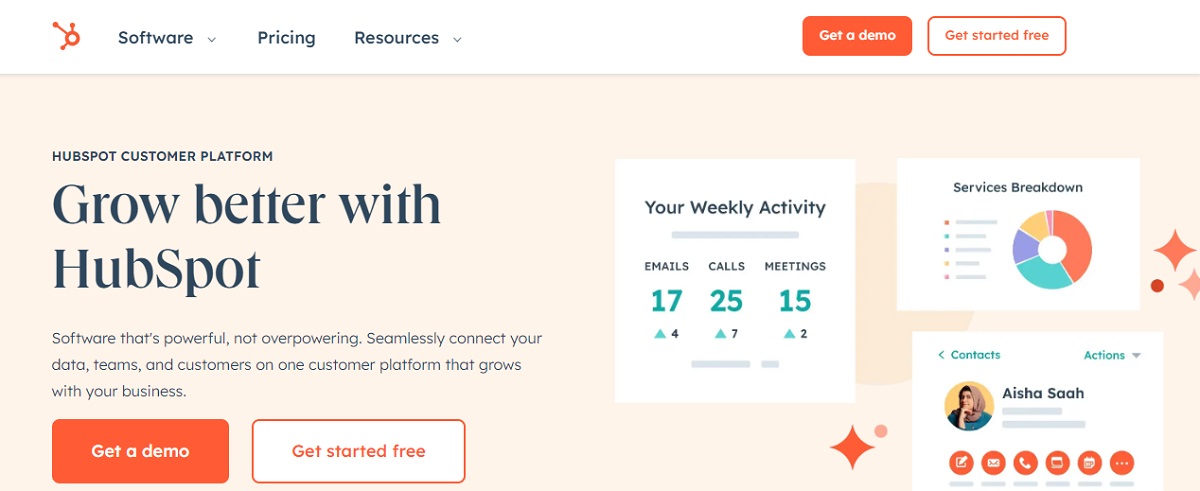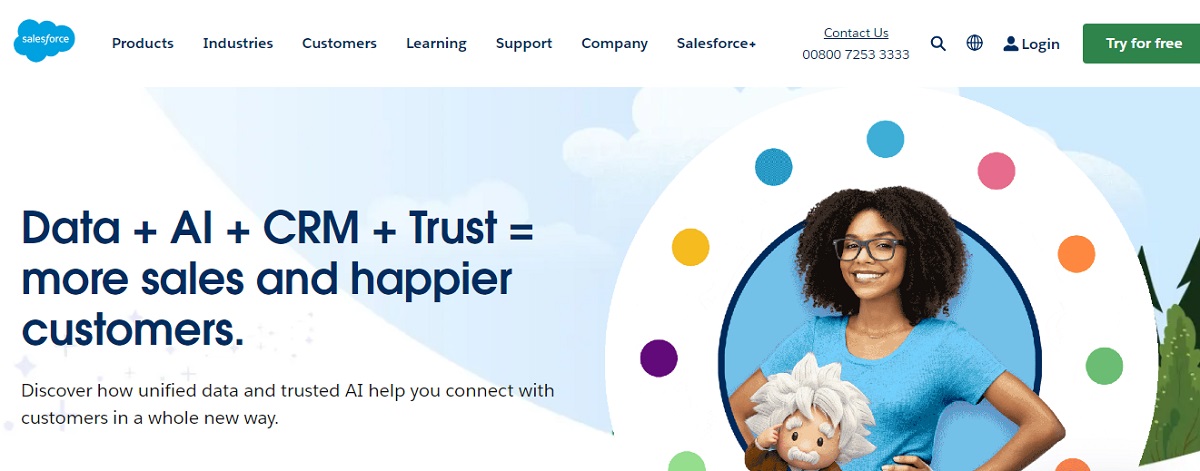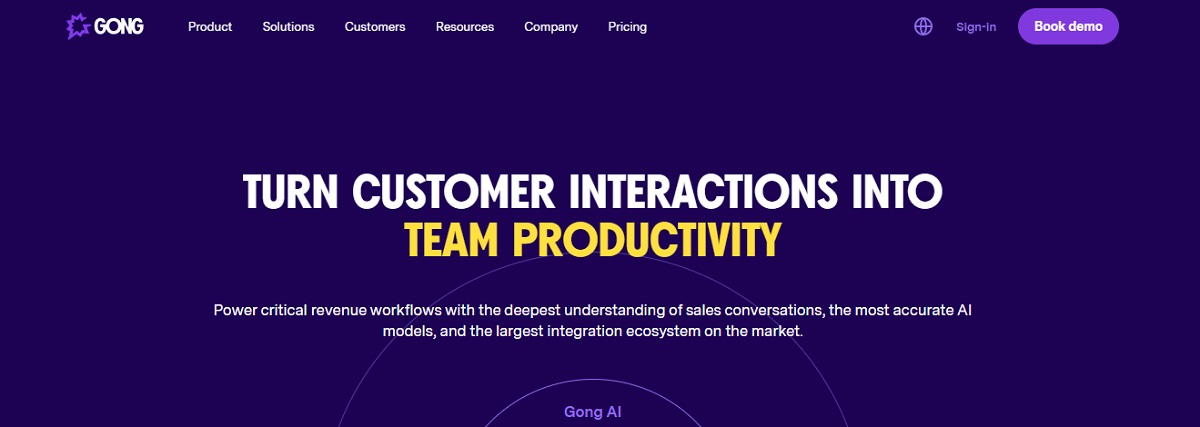Artificial Intelligence in Sales: The Power of Smart Selling Strategies

When you buy something through one of the links on our site, we may earn an affiliate commission.
Artificial intelligence in sales helps businesses understand data better, personalize customer experiences, and predict future trends. It's a powerful tool that enhances performance. AI sales technology has already been adopted by many sales leaders.
This article looks into the transformative impact of AI in sales. It analyzes how artificial intelligence is revolutionizing strategies and processes by enabling more:
- Personalized customer interactions
- Automating data-driven decision-making
- Enhancing efficiency.
Contents
What is Artificial Intelligence in Sales?
Artificial intelligence in sales uses advanced AI algorithms and analytical tools. It enhances operations.

This technology assists in simplifying and optimizing processes through:
- Machine learning
- Computer vision
- Natural language processing.
AI's role is not to replace human sales reps but to empower them. Thanks to AI, sales professionals can focus more on critical thinking and emotional intelligence.
AI tools are designed to:
- Analyze large datasets
- Extract insights to make predictions
- Make recommendations
- Help with decisions.
The process enhances planning and job satisfaction. It also leads to more personalized customer experiences.

This self-improving technology aids in everything from:
- Drafting marketing materials
- Analyzing customer data
- Optimizing strategies and actions.
AI plays a significant role in boosting productivity and performance.
The Need for Sales Automation
The need for AI automation arises from its algorithm's ability to analyze large data sets in many different ways.

AI capabilities are recognized for their potential to:
- Improve efficiency and enhance processes
- Improve productivity
- Drive revenue growth.
Improve Efficiency
AI technology can improve efficiency in your business.
AI-Powered Strategies
Use AI-driven strategies to:
- Manage teams more effectively
- Streamline processes
- Improve customer experience.

Leverage Emerging Technologies
Use new AI technologies to outperform competitors. AI tools can offer significant advantages in understanding market trends and customer behavior.
Coaching and Training with AI
Use AI to review customer interactions and identify areas for improvement. Implementing best practices leads to more effective coaching and training.
Enhanced Decision-Making
Intelligent, integrated AI-enabled solutions can improve decision-making processes.
Lead Scoring and Sentiment Analysis
Use AI for advanced lead scoring and sentiment analysis. This ensures that efforts on the leads have the highest potential of converting.
Reduce Repetitive Tasks
AI significantly reduces the need for people to do routine jobs.

Automate Repetitive Processes
AI algorithms can automate mundane, repetitive, and time-consuming tasks like data entry, scheduling, and basic customer service inquiries. This frees up human talent for more complex and creative work.
Enhance Productivity
By taking over monotonous tasks, AI allows employees to focus on higher-level responsibilities. Organizational productivity gets a boost.
Perform Predictive Analysis
AI can predict fluctuations in demand and optimize stock levels. This reduces wastage and improves efficiency in inventory management.
Automate Tasks with Machine Learning
Machine learning algorithms enable AI systems to learn from data and improve over time. It can effectively handle repetitious work without human intervention. Want to know more about this topic? Read our article on ten powerful machine learning platforms.
Improve Decision-Making Processes
AI aids in decision-making by quickly processing and analyzing large sets of data. This is particularly useful in repetitive analytical tasks.
Base Decisions on Accurate Predictions
AI can significantly enhance the accuracy of sales predictions.

Data Analysis and Pattern Recognition
AI algorithms excel at analyzing large datasets and identifying patterns. These might not be evident to humans. The analysis can uncover insights that lead to more accurate forecasts.
Predictive Modeling
It can produce predictive models based on seasonal trends, economic indicators, consumer preferences, and marketing efforts.
Customer Segmentation
AI can segment customers. This segmentation allows for targeted and effective strategies.
Demand Forecasting
It can predict demand based on past sales activities, seasonal trends, and market changes.
Integrating External Data
AI can incorporate external data sources to make more comprehensive predictions.
To achieve accurate predictions, it's important to have quality data. Continuous monitoring and adjustment of AI models are essential to maintain their accuracy over time.
What AI can do for Sales Performance
Artificial intelligence is revolutionizing sales performance.
Predictive Sales AI
The task of AI in predictive sales methodology involves several key functions.

Lead Generation and Qualification
AI helps sift through vast data sets to identify and qualify leads more likely to convert. This enhances the efficiency and effectiveness of the process.
Analyzing Historical Data
AI tools analyze past conversations, buyer behaviors, and customer experiences. The software uses this information to identify patterns and trends. The analysis helps you understand what strategies work best for different customer segments.
Forecasting
AI-powered solutions are used for accurate forecasting. They can predict future sales performance based on current data trends. AI helps in strategic planning and resource allocation.
Optimizing Marketing and Sales Strategies
AI in predictive sales involves using insights from data to optimize marketing and strategies. These actions allow you to better target your customers. And it leads to higher conversion rates.

AI uses advanced data analysis and machine learning to understand and anticipate customer needs. It improves lead generation and helps to optimize strategies for enhanced performance.
You can also invest in lead-generation tools to grow your business.
Conversational AI
A conversational AI tool can help sales in several ways.
Efficient Lead Qualification
Conversational AI scores leads by analyzing:
- Traffic sources
- Online behavior
- Historical sales data.
This helps to identify high-quality leads.
Enhanced Productivity and Efficiency
Conversational AI can:
- Automate time-consuming tasks
- Streamline prospect interactions
- Support data-driven strategies.
Sales teams can then focus on more interesting high-value sales activities.

Always-on Customer Engagement
Conversational AI provides round-the-clock availability. This ensures that customers receive instant help. It leads to improved customer satisfaction.
Personalized Customer Experiences
Conversational AI can analyze:
- Customer interactions
- Past purchases
- Responses to promotional offers.
This way, it can identify opportunities to upsell or cross-sell products or services.
Real-time Assistance
Platforms like Drift, ChatSpot, or Zoho's Zia can provide:
- Real-time AI help
- Advanced AI coaching
- Robust analytics for sales teams.
Improved Forecasting
AI can analyze customer data and predict customer behavior. So, conversational tools can help teams with accurate forecasting.
Monitoring Sales Calls
Here are some ways AI can help sales by integrating in monitoring calls.

Real-time Feedback and Guidance
The AI tool can provide real-time feedback to salespeople during calls. At the same time, it will suggest responses and guide conversations based on customer reactions.
Automated Call Analysis
Vast amounts of call data can be analyzed by AI. The AI algorithm can identify patterns and insights that would be difficult for humans to detect. This analysis can discover new effective techniques. Customer concerns and market trends may surface at the same time.
Speech and Sentiment Analysis
AI can provide insights into customer mood and satisfaction levels by analyzing the tone, pace, and language used in calls. This information can be used to improve communication strategies and customer service.
Enhanced Training and Coaching
AI-driven analytics can pinpoint specific areas where sales reps need improvement. The findings will allow for more targeted and effective training. AI can also identify best practices from top-performing reps to be shared with the rest of the team.

Lead Scoring and Prioritization
AI can evaluate potential leads based on their interaction during calls. Sales teams can then use this information to prioritize leads more likely to convert.
Customized Scripts
Generative AI can generate dynamic scripts that adapt to real-time customer responses. The real-time response ensures that the conversation is always relevant and engaging.
Voice Bot Integration
AI can incorporate voice bots for initial customer interactions. It can gather basic information and solve simple queries. This allows human sales reps to focus on more complex and high-value interactions.
Sentiment Analysis
Artificial Intelligence is pivotal in sentiment analysis.
Natural Language Processing (NLP)
AI uses NLP to understand and interpret human language. NLP allows the AI to comprehend the context and nuances of language. This is essential for accurate sentiment analysis.
Machine Learning Algorithms
AI employs ML algorithms to classify text into positive, negative, or neutral sentiments. These algorithms learn and then apply this learned knowledge to new data.
Real-time Analysis
AI can process and analyze data in real-time. It can provide instant insights into public sentiment. This is particularly valuable for businesses to gauge product, service, or marketing campaign reactions.

Emotion Detection
Some advanced AI models go beyond fundamental sentiment analysis. They detect emotions like happiness, anger, or disappointment. This provides deeper insights into customer attitudes and perceptions.
Outreach via Email and Social Media
In boosting sales performance, artificial intelligence shakes up how we connect through email and social media.
AI tools make emails better by creating personalized content, figuring out the best times to send, and analyzing how people react for smarter follow-ups. This not only saves time but also makes sure each message suits the person receiving it. It helps to build a stronger bond between businesses and customers.
On social media, AI digs through tons of data to spot potential leads, understand user habits, and share content that fits. This means sales teams can be more strategic and use data to connect with the right audience at the perfect moment.
The magic of smart selling with AI is turning outreach into a lively, personalized, and responsive way to create long-lasting customer relationships.
3 Artificial Intelligence Sales Tools
Based on recent insights, the following are considered among the best AI sales tools.
HubSpot
HubSpot CRM is a versatile platform designed to cater to businesses of all sizes.

It offers a centralized customer database for storing all customer data in one place. This ensures seamless access across marketing, sales, service, content management, and operations teams.
Key features include:
- Lead capturing
- Enhanced customer understanding
- Effortless communication management
- Automated data entry.
HubSpot has a user-friendly interface. It offers inbound marketing tools, CRM integration, and email marketing capabilities.
Its benefits lie in offering:
- A unified view of the customer
- Efficient team collaboration
- Streamlining various business processes.
HubSpot's comprehensive approach to CRM enhances business efficiency and improves customer relationship management.
Salesforce
Salesforce is a comprehensive Customer Relationship Management platform. It offers a wide array of features and benefits for businesses.

Key features include:
- Contact and account management
- Opportunity management
- Lead management
- Quote management
- Advanced analytics through Einstein Analytics.
The platform is designed to streamline business and improve sales processes. And enhance productivity and sales forecasting.
Salesforce provides a holistic pipeline view. Businesses can use it to gauge and find opportunities.
Its benefits include:
- Leveraging customer information to boost sales
- Cross-functional insights and reporting
- Facilitating customer-centric automation for proactive customer interactions.
Salesforce can improve sales and marketing efforts by providing actionable data dashboards. This software package enhances the efficiency and effectiveness of business operations.
Gong
Gong is a conversational intelligence platform designed for revenue and salespeople.
It captures and analyzes customer interactions, providing critical insights into conversations.

Key features include:
- Reviewing and scoring calls
- Data-driven coaching
- Leaderboard functionality
- Video recording
- Lead scoring.
Gong's Reality Platform™ uncovers vital details in customer conversations. It empowers revenue teams to win more deals through informed decision-making.
The tool benefits members across various roles by visualizing sales team performance.
Its ability to deliver insights at scale helps teams make data-backed decisions rather than relying on opinions. It enhances overall sales strategy and execution.
How to Get Started with Artificial Intelligence in Sales
Getting started with AI involves a few key steps.
Understand the Basics
Familiarize yourself with the fundamental concepts of AI and how it applies to sales. This includes understanding different AI technologies.

Identify Your Needs and Goals
Determine what you want to achieve with AI in your sales process. This could range from better understanding customer needs and predicting customer behavior to automating tedious tasks.
Learn Critical Skills
Equip your team with the necessary skills to work alongside AI. This includes data analysis and interpretation of these insights into the strategy.
Choose the Right Tools and Technology
Select AI tools and platforms that align with your goals. Look for solutions that can automate tasks, predict sales, and provide valuable customer insight.
Experiment with Technology
Start with small pilot projects to see how AI can benefit your sales process. Experiment with AI tools for tasks like customer data analysis or chatbots for customer interaction. If you want to know more about chatbots specifically, read our article that discusses the best AI chatbots.
Integration and Training
Properly integrate AI tools into your existing processes. Train your team to use them effectively. This might involve setting up new processes or tweaking existing ones to accommodate AI.
Data Collection and Analysis
Ensure you have the necessary data infrastructure. AI relies on large datasets to function effectively.
The steps above will lead to more efficient operations and better customer engagement.
The Future of AI for Sales
The future of AI sales points towards a transformative impact on how business is conducted.

Task Automation and Role Specialization
AI is expected to automate some tasks. This will allow salespeople to focus more on complex situations that require human judgment and emotional intelligence. Specialization will make salespeople more effective in their role.
Enhanced Processes
AI technology will continue revolutionizing sales. It will improve lead generation, customer engagement, and personalization. These advancements will transform how businesses approach marketing and sales strategy.
Support for Sales Representatives (SDRs)
AI will enrich SDRs with messaging backed by customer data and automated summaries of interactions. This will enhance customer relationship management and effectiveness.
Better Customer Service
Over 60% of sales and service professionals believe that generative AI will aid them in serving customers better. This suggests a shift towards more AI-powered tools in sales enablement.

Integration with Sales Roles
AI is not predicted to replace human salespeople completely. But its role will be deeply integrated into the sales process. It will augment human capabilities and provide critical data-driven insight.
The use case for AI and machine learning will definitely expand in the future.
Concluding Artificial Intelligence in Sales
Using artificial intelligence in sales is a game-changer. The power of AI makes selling smarter and more powerful.
Early adopters have shown that AI makes a sales organization and sales operations run smoother. And it helps build strong relationships with customers.
AI supports the sales manager and sales teams by providing valuable insights for decision-making. It also helps find potential customers and engage with them.
Combining human intuition with AI insights is key as businesses adapt to the new sales landscape. This combination is crucial for successful, flexible, and customer-focused sales strategies.
Improve your sales enablement with artificial intelligence tools before your competitors do it!
Want to learn step-by-step how I built my Niche Site Empire up to a full-time income?
Yes! I Love to Learn
Learn How I Built My Niche Site Empire to a Full-time Income
- How to Pick the Right Keywords at the START, and avoid the losers
- How to Scale and Outsource 90% of the Work, Allowing Your Empire to GROW Without You
- How to Build a Site That Gets REAL TRAFFIC FROM GOOGLE (every. single. day.)
- Subscribe to the Niche Pursuits Newsletter delivered with value 3X per week
My top recommendations

















